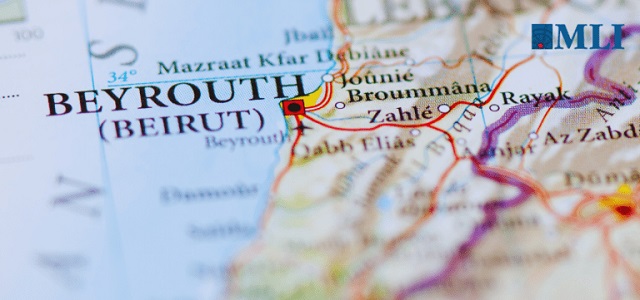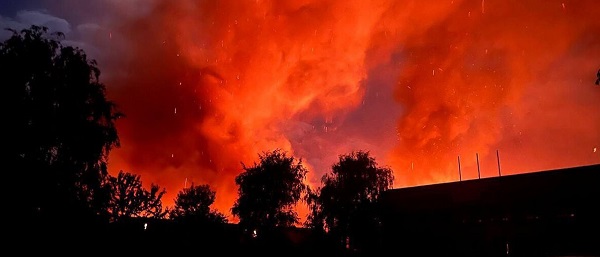conflict
As war looms in Lebanon, will Canada be forced once again to evacuate “citizens of convenience?”: J.L. Granatstein for Inside Policy

From the Macdonald Laurier Institute
By J.L. Granatstein for Inside Policy
It is too late to interfere with the pending evacuation from Lebanon, but we must consider what rights citizens living abroad in perpetuity can have.
Canada is preparing to evacuate Canadian citizens from Lebanon in case the ongoing conflict between Israel and Hezbollah, the well-armed, Iranian-backed terrorist organization, escalates into a full-blown war. Most of Lebanon’s southern border towns have been evacuated as have the kibbutzim and villages of Israel’s north. There are estimates that as many as 75,000 Canadian citizens may be living in or visiting Lebanon.
There is a precedent for an evacuation of Canadians from Lebanon. In 2006, Hezbollah and Israel engaged in a 34-day war that killed some 1,300 Lebanese and 165 Israelis and displaced 1.5 million residents of the two countries. The war ended after Lebanon, Israel, and Hezbollah accepted United Nations Security Council resolution 1701, which called for, among other things, an immediate ceasefire, and the withdrawal of all combatants from southern Lebanon.
There were as many as 50,000 Canadians in Lebanon at the time and Canada moved to get as many of its citizens it could reach – and who wanted to be evacuated – out to Cyprus or Turkey and on to Canada. Some 14,000 were evacuated by air or by sea at a cost that was later reported to be $94 million.
Almost no one asked in 2006 what were the obligations of the Canadian government to citizens living abroad. Many of these citizens had lived in Lebanon for decades, their only link to Canada being their passport. Consider Rasha Solti, who wrote in the Globe and Mail on July 22, 2006: “I hold a Canadian passport, I was born in Toronto when my parents were students there. I have never gone back. I left at age 2.” Solti’s passport was her escape route to Canada if she ever needed it. Did Canada owe her and others like her anything? And while there are no hard numbers, as many as 7,000 of the evacuees reportedly returned to Lebanon after the cessation of fighting.
Obviously, the government has some responsibility to assist Canadians caught up in a conflict. But what about citizens of convenience – those who renew their Canadian passports every five or ten years without visiting, let alone living, in Canada? What duty does Canada have to help Canadian passport holders who have not resided in or paid taxes to Canada for decades – if ever?
The Standing Senate Committee on Foreign Affairs and International Trade studied the 2006 evacuation and its report in May 2007 touched on this issue. A Department of Foreign Affairs official responsible for consular affairs told the Committee that “Until further notice, within the framework of the consular service, a Canadian is a Canadian; the rule is very clear. However, you are right, the debate has been launched and the discussion will take place.”
Well, no real public discussion took place. There were, however, conversations within the federal government, and the nation’s Citizenship Act has been amended several times since 2006. But there are still no residency requirements to remain a citizen. Should there be?
An amendment in 2009 instituted the “first generation limitation” that restricted the scope of those eligible for Canadian citizenship for the future. Citizenship by descent would henceforth be limited to one generation born outside Canada. This law was subsequently deemed unconstitutional by the Ontario Superior Court in December 2023, and the government now has a bill before Parliament that will grant citizenship to eligible foreign nationals whose parent(s) have a substantial connection to Canada and are impacted by the first generation limitation.
In other words – unless the courts subsequently define “a substantial connection” very narrowly – Canadian citizenship can be passed on for generations to those living abroad.
This summer Ottawa is again preparing to evacuate Canadians from Lebanon. The government has bolstered its embassy staff in Beirut and deployed Canadian Armed Forces personnel to Cyprus where they are working with allied nations to coordinate evacuation planning. Prime Minister Justin Trudeau, Global Affairs Canada, and the Canadian Embassy in Beirut have all urged Canadians to leave at once. It’s unknown how many people have taken this advice, but clearly Canada is preparing for a major evacuation if the fighting escalates.
Is it not long past time for Canada to consider what rights are appropriate for those who choose to live abroad? Many permanent residents living outside Canada, as in Lebanon, hold dual citizenship. Should they require genuine ties in or to our country to retain their citizenship and their passports?
Before 1977, Canadians who acquired another nation’s citizenship, except by marriage, lost their Canadian status. Until 1973, Canada required those who wanted its citizenship to renounce their former allegiance. A 1993 parliamentary committee questioned the meaning of loyalty when people held dual citizenship, and it suggested that this devalued the meaning of Canadian citizenship. The committee, in fact, recommended that a Canadian who voluntarily acquired another citizenship should cease to be a Canadian. What the courts might to say to efforts to implement such measures today is unknown.
Still, the Foreign Affairs official in 2006 was correct: A Canadian is a Canadian. But perhaps there is another way to limit the use of our passports as a public convenience. In the United States, all Americans, no matter where they live or how many passports they carry, must file an income tax return as a fundamental continuing obligation of citizenship. Essentially, the US says that those who want to enjoy the benefits of citizenship must help to pay the costs of running the government, and those who don’t want to pay must renounce their American citizenship. This applies to Americans living in Canada.
Washington’s regulation is both reasonable and right. Holding a US passport carries certain obligations. We need to find ways to impose similar obligations on Canadian passport holders living abroad.
In Yann Martel’s famous phrase, Canada is the greatest hotel on earth. He meant that as praise, but to many it has come to imply that they can enjoy the benefits of this country without sharing in the duties and obligations of citizenship. In other words, you can check in, enjoy the facilities, and then check out without paying the bill.
It is too late to interfere with the pending evacuation from Lebanon. But now it is time to consider what rights citizens living abroad in perpetuity can have. It’s time to fully examine whether dual (or triple or multiple) passport holders can remain Canadian citizens. Time at last for a hard look at what Canadian citizenship means in the 21st century.
J.L. Granatstein taught Canadian history for 30 years and was director and CEO of the Canadian War Museum. He sits on the Macdonald-Laurier Institute’s Research Advisory Board.
Artificial Intelligence
AI Drone ‘Swarms’ Unleashed On Ukraine Battlefields, Marking New Era Of Warfare


From the Daily Caller News Foundation
Artificial intelligence-powered drones are making their first appearances on the battlefield in the Russia-Ukraine war as warfare creeps closer to full automation.
In bombardments on Russian targets in the past year, Ukrainian drones acting in concert were able to independently determine where to strike without human input.
It’s the first battlefield use of AI “swarm” technology in a real-world environment, a senior Ukrainian official and Swarmer, the company who makes the software, told the Wall Street Journal in a Tuesday report. While drones have increasingly defined modern battlefields, swarms until now had been confined to testing rather than combat.
“You set the target and the drones do the rest,” Swarmer Chief Executive Serhii Kupriienko told the WSJ. “They work together, they adapt.”
So far, the Swarmer technology has been used hundreds of times to target Russia assets, but was first used a year ago to lay mines on the front, the Ukrainian official told the WSJ. The software has been tested with up to 25 drones at once, but is usually utilized with only three.
Kupriienko told the WSJ that he was preparing to test up to 100 drones at once with the linking software.
A common arrangement used on the battlefield includes one reconnaissance drone to scout out the target and two explosive drones delivering the payload on target, the official told the WSJ.
While Western nations such as the U.S., France and the United Kingdom are also pursuing drone swarm technology, they have not deployed swarm technology on the battlefield the way Ukraine has, according to the WSJ. Currently, autonomous weapons are not regulated by any international authority or binding agreement, but ethical concerns around the technology has led many to call for increased regulation of weapons like the Swarmer system.
The Ukrainian Ministry of Foreign Affairs did not immediately respond to the Daily Caller News Foundation’s request for comment.
conflict
Trump Pentagon Reportedly Blocking Ukraine From Firing Western Missiles Deep Into Russia


From the Daily Caller News Foundation
The Department of Defense has spent months blocking the Ukrainian military from using American and British-made missiles to hit targets deep inside Russia, The Wall Street Journal reported Sunday, citing unnamed U.S. officials.
Undersecretary of Defense for Policy Eldridge Colby reportedly designed the procedure to review requests to carry out the long-range strikes with weapons that are either of U.S. origin or that require American intelligence or use components provided by the U.S., according to the WSJ. Secretary of Defense Pete Hegseth reportedly has the final say on whether Ukrainian forces can use the MGM-140 ATACMS (Army Tactical Missile System) to hit targets in Russia.
The reported blocks on missile strikes coincides with a Trump administration effort to broker a peace deal between Russia and Ukraine. A Pentagon spokesperson declined to comment further on the matter.
BREAKING: President Vladimir Putin reacts to B-2 Flyover pic.twitter.com/1mzVn7DxlW
— Jack Poso 🇺🇸 (@JackPosobiec) August 15, 2025
The Biden administration allowed Ukraine to carry out strikes with ATACMS in November, weeks after President Donald Trump won the 2024 election, the New York Times reported. Trump criticized the move during a December interview with Time magazine.
“It’s crazy what’s taking place. It’s crazy,” Trump said. “I disagree very vehemently with sending missiles hundreds of miles into Russia. Why are we doing that? We’re just escalating this war and making it worse. That should not have been allowed to be done.”
Trump and Russian President Vladimir Putin met in Alaska on Aug. 15 for a summit meeting during which Trump sought to secure a cease-fire in Russia’s war with Ukraine. As Trump greeted Putin, a B-2A Spirit stealth bomber and several fighters carried out a flyover of Elmendorf Air Force Base.
Trump met with Ukrainian President Volodymyr Zelensky and major European leaders on Aug. 18 to update them on the summit.
In July, Trump reached an agreement with NATO where members of the alliance would purchase weapons, including MIM-104 Patriot surface-to-air missiles, and donate them to Ukraine.
-

 National2 days ago
National2 days agoCanada’s free speech record is cracking under pressure
-

 Energy2 days ago
Energy2 days agoTanker ban politics leading to a reckoning for B.C.
-

 Energy2 days ago
Energy2 days agoMeet REEF — the massive new export engine Canadians have never heard of
-

 Business2 days ago
Business2 days agoTaxpayers Federation calls on politicians to reject funding for new Ottawa Senators arena
-

 Energy11 hours ago
Energy11 hours agoCanada’s future prosperity runs through the northwest coast
-

 Fraser Institute2 days ago
Fraser Institute2 days agoClaims about ‘unmarked graves’ don’t withstand scrutiny
-

 Business2 days ago
Business2 days agoAlbertans give most on average but Canadian generosity hits lowest point in 20 years
-

 Business2 days ago
Business2 days agoToo nice to fight, Canada’s vulnerability in the age of authoritarian coercion



